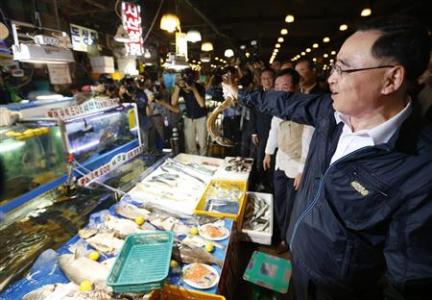(Reuters) – South Korea on Friday extended a ban on Japanese fishery imports to a larger area around the crippled Fukushima nuclear plant due to growing concerns over radiation contamination.

Further fuelling those concerns, the plant’s operator Tokyo Electric Power Co, or Tepco, said it was “very concerned” that radioactive water could flow towards a bypass it is digging to divert clean groundwater around the damaged reactors and into the sea.
The bypass is a key element of the company’s attempts to contain an escalating problem of irradiated water at the nuclear facility that was knocked out by an earthquake and tsunami in March 2011.
The Korean move – widening its ban to cover imports from eight Japanese prefectures, including Fukushima – came as Japan’s Prime Minister Shinzo Abe broke away early from a Group of 20 Summit in Russia to pitch Tokyo’s bid to host the 2020 Olympic Games, with assurances that the Japanese capital would be safe for all those coming to the Games. A decision by the International Olympic Committee is due on Saturday.
A spokesman for the South Korean Prime Minister’s office said the measures were due to “the sharply increased concern in the public about the flow of hundreds of tons of contaminated water into the ocean” at Fukushima. The indefinite ban, which takes effect on Monday and affects some of Japan’s biggest fishing areas, adds to international pressure to fix the crisis at the Fukushima plant, 230 km (140 miles) north of Tokyo.
China has banned imports of dairy, vegetable and seafood products from at least five Japanese prefectures, including Fukushima, since the disaster.
STRICT INSPECTIONS
Korean Vice Fisheries Minister Son Jae-hak said information received from Japan was not good enough to properly judge the situation, and Seoul will also tighten testing on fisheries imports from other parts of Japan.
South Korea imported 5,000 metric tons (5511 tons) of fishery products from the eight affected prefectures last year, out of a total of 40,000 metric tons of imports from Japan, Son said.
Tepco admitted in July, after months of denials, that contaminated groundwater was leaking into the sea.
Yoshihide Suga, Japan’s top government spokesman, insisted the country’s fisheries exports are safe for consumption, with stringent inspection procedures in place. Toxic water is confined to a small bay near the Fukushima plant and, even there, he said, radiation readings are well within permitted levels.
“We have been providing relevant information to the South Korean government,” Suga told reporters. “We would like South Korea to take steps based on scientific evidence.”
Tepco said last month that 300 metric tons of toxic water leaked from one of hundreds of tanks assembled to store contaminated run-off, and it has since found radiation hotspots in three other holding areas.
As the sense of crisis has escalated, Abe’s government this week pledged nearly half a billion dollars to help Tepco try to contain the contaminated water.
The tank that leaked radioactive water is at least 130 meters (426 feet) above the planned bypass area, but Tepco said the leak may have already reached groundwater – suggesting the bypass may have to be dug much further from the sea than planned, complicating an already fraught effort.
“We’re not at the point where we can say radioactive water is actually reaching the groundwater, but if it’s having an impact we will have to consider other measures,” said Tepco spokesman Noriyuki Imaizumi.
Local fishermen have consistently opposed the bypass plan, and on Friday reiterated they would not accept any release of even low-radioactive water into the sea, as has been suggested by Japan’s nuclear regulator.
(Additional reporting by Aaron Sheldrick, Kiyoshi Takenaka, Kentaro Hamada and Leng Cheng; Writing by William Mallard; Editing by Ian Geoghegan)





